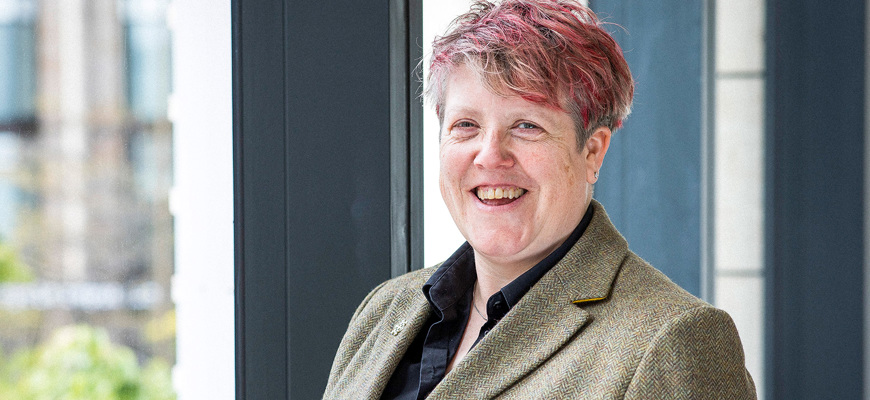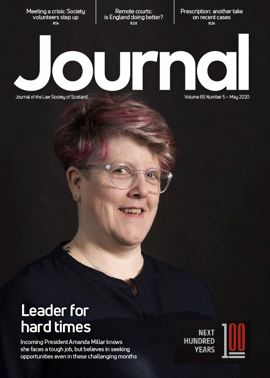Challenge of a lifetime

Incoming Presidents of the Law Society of Scotland have often, with reason, spoken of the challenging times that lie ahead. None can have had more reason to do so than Amanda Millar.
With, to the Society’s knowledge, 90% of our firms facing reduced turnover, and a quarter of solicitors in private practice on furlough, due to coronavirus, she can fairly claim that the present time is “truly the challenge of a lifetime: one that people who are practising now will never have encountered before”. Certainly it far exceeds even the economic shock following the 2008 credit crunch.
As Vice President this past year, Millar has already seen a spread of events from the Society’s platinum anniversary celebrations, to the “visibility issues around 100 years of women in law” (a cause close to her heart), to working alongside President John Mulholland on emergency support measures as the COVID-19 crisis unfolded.
That last exercise has delivered a proposed 20% cut in the next practising certificate fee and accounts fee, plus a zero client protection fund contribution. “As is invariably the way, you do get mixed reviews but mostly it has gone down incredibly well,” Millar reports. “The Society is acknowledging the challenges to the profession and doing what it can, and we will continue to do what we can. It is about maintaining the viability of the legal profession, but also our ability to regulate, promote, safeguard and meet all those statutory duties which we must not lose sight of.”
Giving extra
Asked what it means for the Society, she replies that the specifics are still being looked at, but while tough choices will have to be made, “what we’ve delivered in the package is what we believe can be delivered at the moment”. The Society has furloughed some staff, and all CPD events have been cancelled, but further choices will have to follow.
She does believe, however, that the crisis has brought the profession together in the effort to mitigate its effects. “The circumstances here are unprecedented, but people are pulling together; that’s very much the feeling I get. On the financial package, the level of active positivity that has resulted is quite surprising: it’s a sign that everybody acknowledges what is going on and the efforts that are being made, and that’s really important.”
The same applies to the volunteers on the Society’s committees, many of whom have gone the extra mile and more (see next feature) in working with Government and others to address the challenges facing their particular sectors. “They already take time out of their working lives in average circumstances, and many of them have taken even more time to deal with these issues and provide the support necessary from a legal perspective in developing the legislation in these incredibly challenging times, when lots of these members are also looking to their own family and firm responsibilities.
“I’m overwhelmed by the level of step up to the plate that’s coming from many of our members in relation to the challenges to be faced and their willingness to help everybody meet these as far as possible. And it’s a big privilege for me to have the opportunity to represent such a fantastic group of people, both solicitors and also the lay members for the contributions that they make.”
Particular concerns
Millar declines to predict what professional life might look like once restrictions are lifted, except to say that there will be no going back to how things were just a couple of months ago. “I don’t believe anybody, not just the legal profession, can go back to where we were in February – we are going to have to deal with a new normal.”
It is clear, though, that much more is likely to be done through technology. Millar has sat on the LawscotTech advisory board for some two years (describing herself as “the non-techie in the room”); its work will become even more important in trying to develop areas of technology relevant to the profession, “and hopefully given the challenges we’ve encountered there will be increasing engagement of the profession in relation to that”.
At the same time she has a real concern, as someone strongly committed to the role of lawyers and the rule of law in society, that basic rights are not set aside in the desire to move on. “One particular difficulty is that when people are dealing with emergencies, there is always the risk that human rights or other protective issues are seen as less important, and we must be vigilant that the new normal does not get us to the point where rights that had been put in place and protected are in any way lost or diminished.”
That applies with equal force to her desire to see a profession that is as diverse and inclusive as possible. As may be well known by now, Millar is the first from the LGBT+ community to assume the presidency, and while not wanting to be seen as a “flag bearer”, she recognises the importance of being there as a role model. “At the present time I think this is even more important, because we live in the reality that we still have many young people who need role models to believe that they can do what they are capable of doing and to be their whole selves when deciding what to do with their own futures.”
That said, it is also important to her to be seen as someone who has been elected on merit. “The reality is I have been elected by my peers to be President of the Law Society of Scotland, and I don’t believe that the people who elected me did so because I was going to fill a diversity box.
I am confident having gone through a contested election that they believed I have the skills to represent the Society to the best of my ability. I have a range of diverse characteristics. There isn’t anybody in the world who doesn’t.”
Drive to deliver
Looking to the Society’s more regular agenda, matters other than the pandemic will be waiting to be dealt with. This year may or may not see the Government’s consultation on the future regulation of the profession, following its attempt to identify a consensual approach to the key recommendation of the Roberton report for a new independent regulator, but as far as Millar is concerned the Society as regulator “will continue to meet the high standards and continue to develop in the time that I am in position as President”.
She adds: “Those issues must be considered alongside the challenges that are being faced at the moment, both by members and by the public, and where the report gave no evidence of mischief to justify a need for an independent regulator there is a need for all to be flexible, think differently and improve how we respond to changes in the legal services market.”
This year is also when the Leading Legal Excellence strategy concludes its five year term; what might succeed it may now be rather different from what would have been anticipated until recently. “That will continue to be reviewed given the very changed circumstances we find ourselves in,” Millar assures us. “As far as the principles are concerned, we’re obviously continuing to adhere to our existing strategy and work through that. I think it’s fair to say the work done by the Society since the lockdown is ongoing evidence of the desire, passion and delivery in relation to Leading Legal Excellence.”
Seeking the positives
One thing she is determined the Society will not be doing is just responding to whatever events unfold. “There will be an element of that, but it will also be important from my perspective to continue to have active ongoing engagement, and that means not being caught on the back foot, as far as possible in circumstances as unpredictable as these. That’s part of the task of leading an organisation that is looking to lead legal excellence and meet responsibilities in relation to members, and also meet responsibilities in relation to promoting and safeguarding the interests of the public.”
And even in our present situation there will be opportunities to be grasped. “While these are really challenging, really difficult times for everybody, and we can’t underestimate the horrors in relation to what people have experienced in this crisis, from every crisis there will come both challenges and opportunities and it’s about being able to show the level of flexibility and willingness to engage in all the conversations so that people come out the other side in as positive a way as possible.”
She concludes: “As you’ll have gathered I’m a fundamental believer in the rule of law, in the independence of the profession, and taking a crisis and seeing from that an opportunity, so my focus is about maintaining, it’s about developing, it’s about leaving a legacy where people are able to continue to see the value of a viable legal profession in a meaningful civil society.”
A voice for the voiceless
Amanda Millar has committed herself during her career to ensuring that the voices of the underrepresented are heard. Initially she taught subjects including social welfare law at Strathclyde and Glasgow Caledonian Universities. In practice for 20 years as a Perth-based litigator, she ultimately specialised in mental health and adults with incapacity, becoming the first solicitor to be accredited as a specialist in both these areas.
First elected to Council in 2010, her committee work includes seven years on the Client Protection Committee, two on the Audit Committee, five on Professional Practice and six years on the Mental Health & Disability Subcommittee. She steps down as convener of the Rules, Waivers & Guidance Subcommittee on becoming President. Beyond the profession, she has given of her skills and experience to the third sector as an SCVO Policy Committee member, as board member and then chair of Mindspace Ltd, and as the first non-executive chair of Changing the Chemistry, which focuses on improving diversity of thought on boards.
She lives in Perthshire with her wife Joyce and their dog Darcy, and in her home life she enjoys cooking, eating and supporting Liverpool FC.
Perspectives
Features
Briefings
- Steps to restraining the press
- The CJRS: a developing picture
- COVID-19 and AWI: the Society's blueprint
- Give me liberty or give me an ECHR-compliant lockdown!
- Pensions and the pandemic
- Secure digital signatures: moving forward in a crisis
- PSG: progress during the pandemic
- In-house, from home
- Scottish Solicitors' Discipline Tribunal






